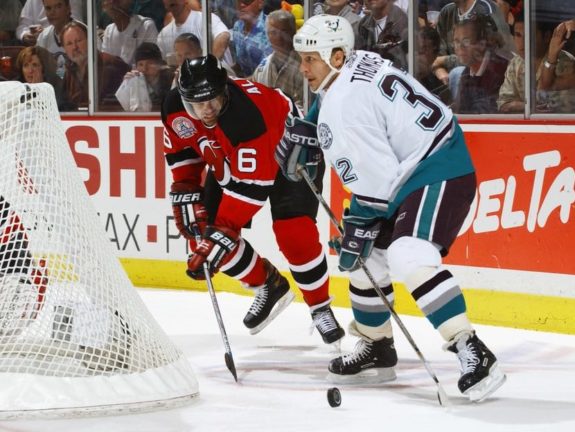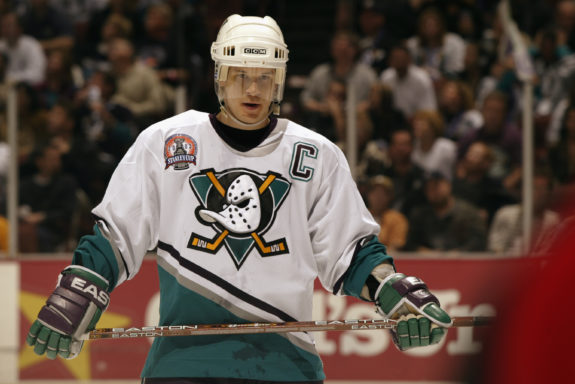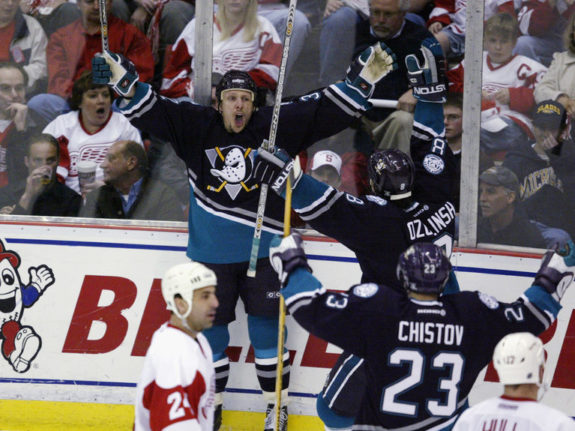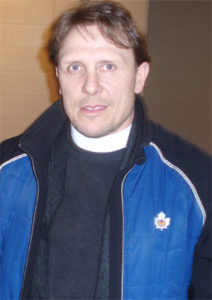Throughout his entire 20-year NHL career, winger Steve Thomas had an uncanny ability to be in the right place at the right time. His 78 career game-winning goals are more than Mario Lemieux, Marcel Dionne, Alex Delvecchio, Jari Kurri, Bryan Trottier, Jean Ratelle, Martin St. Louis, Darryl Sittler, or any number of other Hall of Famers, Stanley Cup-winners and All-Stars ever scored. The somewhat diminutive winger nicknamed “Stumpy” was a perennial “Johnny-on-the-spot” for his entire NHL career.
Thomas scored 421 times during the regular season over a stretch of 1,235 games. Many of those tallies were generated by his downright tenaciousness for puck pursuit. A two-time 40-goal scorer, Thomas likely would have hit the 50-goal plateau at least once in his career if it were not for his 1,306 penalty minutes.
In the twilight of his career, Thomas became the feel-good type of player whom you just wanted to see get his name on the Cup. After so many years in the league, so many battles as he played for seven different teams, you just wanted to see him get a moment in the sun. The guy which no team bothered to draft went on to play 20 seasons. Couldn’t he go out on top as he skated off into the sunset?

Well, a fairy tale ending didn’t quite take shape, much to our dismay…
Make no mistake though – for one season Steve Thomas came close – gosh, did he come close! While it would not culminate into Lord Stanley’s silver chalice being raised over his head, Thomas showed during his second to last NHL season that a 39-year-old could still play in the league and still make a difference for his team.
We look back at the tail end of Steve Thomas’ 2002-03 season with the Mighty Ducks of Anaheim. It was undoubtedly a Cinderella story that became one for the ages.
Don’t Miss Our ‘One for the Ages’ Collection
Breaking Into the League With the Leafs
Born in Stockport, England on Jul. 15, 1963, Thomas was raised in Markham, Ontario, Canada. He played parts of four seasons in the OHL for the Toronto Marlboros. Thomas’ finest OHL season was his last one – 1983-84 – when he scored 51 goals and 54 assists for 105 points in 70 games. He finished second in team scoring behind the late Peter Zezel, who had 133 points of his own.
Remarkably, while Zezel was taken in the second round of the 1983 NHL Draft, no team initially took a shot at Thomas. That would change when the Toronto Maple Leafs signed him as a free agent on May 12, 1984. Thomas would make his professional debut that fall. He would suit up in 18 games for the Leafs during the 1984-85 season, and scored his first NHL goal on Mar. 30, 1985 against Detroit Red Wings goaltender Corrado Micalef. However, Thomas primarily played for the Leafs’ AHL affiliate the St. Catharines Saints. Upon scoring 42 goals and 48 assists for 90 points in 64 games, he would receive the Dudley “Red” Garrett Memorial Award as the AHL’s best rookie.
Thomas would earn permanent placement with the Leafs during the 1985-86 season. In his first full NHL season, he scored 20 goals and 37 assists for 57 points in just 65 games. The Leafs would make it to the second round of the playoffs, where they would lose a hard fought full 7-game series with the St. Louis Blues. Thomas led all Toronto players in postseason scoring with six goals, eight assists and 14 points in 10 playoff games.
He would play one more season for the Leafs, scoring 35 goals and 27 assists for 62 points in 78 games in 1986-87. Thomas would also rack up 114 penalty minutes that season too. Little did anyone know at the time that this would be his first of two stints with the Maple Leafs.
Establishing Himself With the Blackhawks
In what was a blockbuster trade at the time, Toronto traded Thomas on Sept. 3, 1987 along with 50-goal scorer Rick Vaive and rugged defenseman Bob McGill to the Chicago Blackhawks. In return, the Leafs received Al Secord and Ed Olczyk. The trade was seemingly lucrative for both clubs, though some would argue that Chicago got the better end of the deal.
Regardless, Thomas’ time spent in Chicago further solidified his ability to be an effective and timely scorer. His first two seasons in “The Windy City” were injury maligned but productive, especially when comparing the amount goals and points he generated with the number of games that he played. But in the 1989-90 season, Thomas reached the 40-goal mark for the first time in his career, and finished the season with 70 points in 76 games. Seven of those 40 goals were game-winners. He would score seven more goals in 20 playoff games as Chicago made it all the way to the semi-final, and three of those were game-winners as well.
As the 1980s came to a close, Thomas would end up playing a little more than four seasons for the Blackhawks. Once again, it would be the first of two separate stints with the team. During his first go-round in Chicago – from 1987-88 up into the start of the 1991-92 season – he scored 95 goals in 231 games. Four times he scored a hat-trick, and 14 of his tallies decided the game in Chicago’s favor.
Scoring Goals All Over
If he wasn’t already, Thomas was becoming a lucrative commodity that could not help but be noticed throughout the NHL. Enough so that within the next 10 seasons he would have stops with four different teams. The most important of which was arguably his time spent with the New York Islanders.
At the beginning of the 1991-92 season, the Blackhawks shipped Thomas and sizable centerman Adam Creighton to the New York Islanders, in exchange for Brad Lauer and Stanley Cup champion Brent Sutter. Thomas would play four seasons with the Islanders, one of which included the lockout shortened 1994-95 season. The first three seasons saw him put up numbers of 28, 37 and a career-high 42 goals for New York. He was at his absolute finest during the 1992-93 season when the Islanders made it to the semi-final against the eventual Stanley Cup champion Montreal Canadiens. Scoring nine goals and eight assists for 17 points in 20 playoff games, he finished tied for ninth in postseason scoring without even making it to the Final.
Moving on from Long Island, Thomas was part of a three-way trade that sent Claude Lemieux to the Colorado Avalanche, Wendel Clark to the Islanders, and Thomas himself to the New Jersey Devils. He would play in “The Garden State” for three full seasons, from 1995-96 through 1997-98. Finding minimal success with the Devils and never making it beyond the second round of the postseason, Thomas would end up making a return tour with two of his former teams.
On Jul. 30, 1998, he signed once more with the Toronto Maple Leafs as a free agent, posting seasons of 28 and 26 goals, before scoring a mere eight in 2000-01. Thomas’ shining moment in his return to Toronto came during the 1998-99 season when he again played in a Stanley Cup semi-final where the Leafs would lose in five games to the Buffalo Sabres.
Becoming a free agent again at the close of the 2000-01 season, Thomas signed with the Blackhawks in July of 2001 for his second stint there as well. He would miss the majority of his first season back in Chicago – 2001-02 – after suffering an ankle injury during a Nov. 15 game against the Calgary Flames.
If we look at the 10 seasons of Thomas’ career from 1989-90 through 1999-00, we can pinpoint it as being the most productive portion of his career. Two 40-goal seasons, one 30-goal season and five 20-goal seasons. Then in the 2000s, he is suddenly returned to Chicago – in his late-30s, limited from injury to just 34 games in his first season, and things looking rather bleak.
With the plot indeed thickened, this is where our Cinderella story takes shape.
The Composition of the 2002-03 Mighty Ducks
Thomas’ second season back in Chicago was not much better either. Healthy again and seeing regular game action, he managed to score a meager four goals in 69 games. It was turning out to be the least productive season of Thomas’ career.
That was when the Mighty Ducks of Anaheim came calling.
The 2002-03 Mighty Ducks are one of the more interesting teams in hockey history, although they often get overlooked because of how briefly they were assembled together. They were more of a one-and-done deal, which is unfortunate because their components were indeed intriguing. After their inception into the league with the 1993-94 season, Anaheim had only made two prior playoff appearances and only one was beyond the first round. As the team was in the midst of their 10th NHL season, things would be different this time around.
Let us look at the composition of this particular squad:
Two eventual Hockey Hall of Famers helped lead the way: their captain and arguably the greatest Duck of all-time, Paul Kariya, and in his 18th NHL season – one of the greatest passers to ever play the game – 40-year-old Adam Oates. Goaltender Jean-Sebastian Giguere had assumed the starting goaltending duties, and was backed up by Swiss-born Martin Gerber. Three previous Stanley Cup winners were on the roster too – forward Petr Sykora (2000 New Jersey Devils), and defensemen Sandis Ozolinsh (1996 Colorado Avalanche) and Fredrik Olausson (2002 Detroit Red Wings). Sprinkle in a supporting cast that included Stanislav Chistov, Dan Bylsma, Sami Pahlsson, Steve Rucchin, Keith Carney, Mike Leclerc, and a slew of others, and the Ducks possessed a remarkable blend of proven veterans and staunch youngsters.

Anaheim would ultimately finish second in the Pacific Division with a record of 40-27-9 for 95 points – good enough for seventh place in the Western Conference. Wanting to be better prepared for the playoffs, the Ducks made two important trade deadline moves on Mar. 11, 2003. The first of which brought them center Rob Niedermayer from the Calgary Flames in exchange for defenseman Mike Commodore and goaltender Jean-Francois Damphousse. The second move saw them send a 2003 fifth round draft pick to the Blackhawks to receive Thomas in return.
While the trades were done certainly for the benefit of the team, the Ducks would not know at the time that both newly acquired players – particularly Thomas – would ensure them a definitive run at the Cup.
Thomas’ 2002-03 NHL Season
Sometimes changes in environment or receiving the positive affirmation of being wanted can promote true productivity in an individual. Whether Steve Thomas was inspired from being acquired by the Ducks or somehow rekindled his spark, he was just awesome after coming to Anaheim in the trade. Scoring just the four goals in 69 games with Chicago, he suddenly erupted with 10 goals in 12 games for the Ducks. Factor in his three assists, he was better than a point-per-game player. Three of those tallies were decisive in winning games for Anaheim.
While his sudden increase in scoring was certainly tremendous for the Ducks, Thomas brought a great deal more than that to his new team. Just shy of 40 years old, he was a solid mentor for many of the younger players. More often than not, Thomas played on the same forward line as the Russian Chistov – a rookie who turned 20 years old just days after Thomas was acquired by the team. Other teammates such as Pahlsson, LeClerc, Jason Krog and Alexei Smirnov were all newcomers and were in their early or mid-20s as well.
These Ducks were a unique blend of youth and veteran, and Thomas was the final ingredient to make it all come together.
We take a look now at some of the finer moments from Thomas’ 2002-03 NHL season:
Mar. 12, 2003:
The very next day after his trade to the Mighty Ducks, Thomas faced his former team the Chicago Blackhawks. In what some might call a thumbing of the nose against his previous club, he proceeded to burn them for two goals in his first game for Anaheim. Thomas scored the Ducks first goal of the game with assists from Chistov and Olausson. Scoring the team’s third goal as well – this time from Adam Oates – would hold up to be the game-winner as Anaheim won the contest 5-2.
Mar. 13, 2003:
Thomas continued to be absolutely lights-out for the Ducks. The very next day Anaheim hosted the San Jose Sharks, and would play them to a 3-2 overtime win. With the Sharks up 2-1 after two periods, Thomas set up defenseman Vitaly Vishnevski for the tying goal at 4:58 of the third period. The goal was only Vishnevski’s second of the season. With the game in overtime, the big Russian returned the favor. As Visnevski and Chistov worked the puck back to Thomas, the 39-year-old winger beat Miikka Kiprusoff in OT to seal the victory for the Ducks. In 24-hours time, Thomas had scored three goals and an assist for his new team.

Apr. 1, 2003:
The Ducks played the Predators in Nashville. Thomas’ performance in this game seemed to be a one-man show. He opened the scoring in the game with an unassisted goal in the second period against Tomas Vokoun. Nashville’s Scott Hartnell would tie the game nearly seven minutes later. With both teams deadlocked at the end of regulation, the game went into overtime. With 53 seconds remaining in the extra session, Thomas won it for his hockey club as he converted on a play from Niedermayer and defenseman Ruslan Salei. The Ducks skated away with the 2-1 overtime victory.
Apr. 4, 2003:
This time around the Ducks would be on the losing end of a 4-3 overtime victory by the Colorado Avalanche. Thomas had a point on all three Anaheim goals in the loss – scoring two of them himself. With the Avalanche already up 1-0, Thomas scored in the first period against Patrick Roy with assists to Ozolinsh and Kariya. The Avalanche would go up 3-1 after Peter Forsberg and Adam Foote both tallied. Thomas would be responsible for orchestrating the Ducks comeback. At 9:54 of the third period, he got the Ducks within one as he scored on a feed from Leclerc and Chistov. Less than three minutes later, Thomas would earn the primary assist on Niclas Havelid’s goal to tie the game. Krog would earn the secondary helper. Once in overtime though, Milan Hejduk would win it for Colorado with just 10 seconds left.
Apr. 12, 2003:
The Ducks faced the defending Stanley Cup champion Detroit Red Wings in the opening round of the playoffs. On the road in Game Two, Thomas was the difference maker again. He and Pahlsson helped set up Chistov for the first goal of the game. The Red Wings would rebound to take a 2-1 lead on goals from Jason Woolley and Luc Robitaille. Krog would score in the third period to knot things up at 2-2. Slightly more than two minutes later, Thomas would fire one past Curtis Joseph to put the Ducks up 3-2 for good. Niedermayer would pick up the lone assist on Thomas’ game-winner. Anaheim would sweep Detroit in four straight games.
May. 5, 2003:
Anaheim would go up against the Dallas Stars as their second round opponent. Thomas was at his best in the decisive Game Six to put the Stars away. The Ducks led the series three games to two, and were confronted with the danger of having to return to Dallas for Game Seven if they suffered a loss. Dallas’ Kirk Muller had already put the Stars up 1-0 after the first period. Thomas would then score the first goal of the second frame to make it 1-1 at the 2:25 mark. Two minutes later he and Krog would set up Chistov to put Anaheim ahead 2-1, but before the period would end Niko Kapanen would tie the score again for Dallas. As the teams entered into the third, Thomas passed to Salei who scored his first goal of the playoffs. Ultimately the Stars would tie the score once more at 3-3, but would finally be stymied when Ozolinsh scored the game-winner and series-winner with slightly more than a minute remaining in the game. The Ducks would advance with the 4-3 victory at home.
Jun. 2, 2003:
Having swept the upstart Minnesota Wild in the semis, the Ducks found themselves in the midst of a Stanley Cup Final against the New Jersey Devils. The game on this date marked a pivotal moment in the series as the Devils were already ahead of the Ducks two games to one. If Anaheim were to lose Game Four they would have been one game away from elimination and heading back to New Jersey. Thomas would once more be the hero. The Ducks had to kill off three penalties in regulation, as opposed to just one for the Devils. With the score tied 0-0 at the end of three periods, Game Four went to OT in Anaheim. Just 39 seconds into the extra session, Thomas fed the puck down low to Ozolinsh and Pahlsson who took a stab at it. The loose puck caromed out front of Devils goalie Martin Brodeur. Sailing in from the point, Thomas fired it home to win the game 1-0 for the Ducks.
Jun. 7, 2003:
Game Six would be win or bust for Anaheim. With that in mind, the Ducks sprung for their biggest goal output of the Cup Final. Anaheim would receive goals from four different players as they decisively defeated the Devils 5-2. After Rucchin had given his team a 2-0 lead in the first period, Thomas added a third goal in the opening frame to put the Ducks even more out front. With New Jersey’s Jay Pandolfo and Grant Marshall both tallying, the third goal from Thomas ended up being the game-winner. Kariya and Sykora would add goals as well to seal the victory, and the series was then tied three-all.
The Ducks Came so Close…
Despite Thomas’ heroics in Games Four and Six, Anaheim would ultimately fall short to the Devils. The pinnacle Game Seven was played on New Jersey ice, and the Ducks could just not put one of their 24 shots past Brodeur. The Hall of Fame goaltender would whitewash Anaheim 3-0. New Jersey’s Mike Rupp scored the Cup-winning goal, while former Duck Jeff Friesen added two more. Rupp would have an assist on both of Friesen’s goals.
In the losing effort, Giguere would receive the Conn Smythe Trophy as the Most Valuable Player in the playoffs due to his heroics in the Ducks net. Three seasons later in 2006-07 (remember that the 2004-05 season was a lockout and no Stanley Cup was played work) Giguere backstopped Anaheim to their first Stanley Cup championship. The only players remaining to win the Cup from the 2002-03 roster were Giguere, Niedermayer, Pahlsson, and Andy McDonald.
For Thomas, 2003 would be the only Stanley Cup Final appearance of his 20-year career. It would be easy to be bitter over the Game Seven loss, but hindsight teaches us that there is some sweetness added in there too. We do not know how Thomas himself regards this Cup-run, but we consider it a portion of his career that he should be most proud of. Most of his contemporaries had long since retired. Yet here he was at 39 years old, in the twilight of his career, and scoring overtime game-winning goals in the Stanley Cup Final.
Thomas gave the Ducks a legitimate chance to win the Stanley Cup, and he did so in dramatic fashion. This is what makes 2002-03 his one for the ages season.
After the Run at the Cup

Steve Thomas would play one more NHL season in 2003-04. At the age of 40, he signed with the Detroit Red Wings on Nov. 3, 2003 to have one final shot at a Cup. Thomas played decently well, but with limited action. He scored 10 goals and 12 assists for 22 points in 44 regular season games. In most instances,Thomas was teamed up on a line with Pavel Datsyuk and Brett Hull. At one point during the season he scored 10 points in 14 games (7G, 3A).
As the postseason got underway, Thomas played in six of the Red Wings 12 playoff games. He picked up a lone assist during the half-dozen appearances, and helped the Red Wings dispel Nashville in the opening round. Unfortunately, Detroit would suffer a 4-2 series loss to the Calgary Flames in the second round, and Thomas’ playing career would be over.
Since his retirement as a player, he has held assistant coaching positions with both the Tampa Bay Lightning and the St. Louis Blues. Separately, Thomas’ son Christian is a 2010 second-round selection of the New York Rangers. The younger Thomas has played in NHL games for the Montreal Canadiens and Arizona Coyotes.
Steve Thomas is not a Hall of Famer, but we want to acknowledge that he was a darn good hockey player. His penchant for scoring goals at key times and during big moments is what he will be best remembered for. His brief time as a Mighty Duck of Anaheim is a prime example of a Cinderella story without the fairy tale ending, but it is no less relevant of a tale. Rather, it draws more appreciation to what Thomas accomplished during his career.
More ‘One for the Ages’ Stories:
- 1968-69 Doug Harvey, St. Louis Blues
- 1970-71 Charlie Hodge, Vancouver Canucks
- 1970-71 Roger Crozier, Buffalo Sabres
- 1972-73 Alex Delvecchio, Detroit Red Wings
- 1972-73 Bill ‘Cowboy’ Flett, Philadelphia Flyers
- 1973-74 Bill Goldsworthy, Minnesota North Stars
- 1979-80 Dave Keon, Hartford Whalers
- 1979-80 Jim Schoenfeld, Buffalo Sabres
- 1981-82 Billy Smith, New York Islanders
- 1983-84 Tom Barrasso, Buffalo Sabres
- 1985-86 Mats Naslund, Montreal Canadiens
- 1993-94 Sergei Zubov, New York Rangers
- 1995-96 Wayne Gretzky, St. Louis Blues